
Cardiology Journal
Scope & Guideline
Advancing cardiovascular knowledge without barriers.
Introduction
Aims and Scopes
- Cardiovascular Disease Management:
Research on the diagnosis, treatment, and management of various cardiovascular diseases, including coronary artery disease, heart failure, and arrhythmias. - Innovative Interventional Techniques:
Exploration of new interventional strategies and technologies in cardiology, such as catheter-based therapies, heart valve interventions, and advancements in imaging. - Risk Assessment and Prevention:
Studies focusing on the identification of cardiovascular risk factors and the development of preventive strategies to reduce the incidence of cardiovascular events. - Patient Outcomes and Quality of Life:
Research evaluating the impact of cardiovascular diseases and treatments on patient quality of life, including psychological factors, rehabilitation, and long-term outcomes. - Emerging Technologies and AI in Cardiology:
Investigation of the role of artificial intelligence and novel technologies in diagnosing and managing cardiovascular conditions.
Trending and Emerging
- Impact of COVID-19 on Cardiovascular Health:
A significant increase in publications addressing the relationship between COVID-19 and cardiovascular conditions, including the effects of the virus on cardiac health and management strategies for patients with pre-existing cardiovascular diseases. - Use of Technology and Telemedicine:
Growing interest in the application of telemedicine and digital health technologies in managing cardiovascular diseases, particularly in the context of remote monitoring and patient engagement. - Personalized Medicine and Genomics:
Emerging focus on personalized treatment strategies based on genetic profiling and individual patient characteristics, aiming to optimize therapeutic outcomes in cardiovascular care. - Chronic Total Occlusions and Advanced Revascularization Techniques:
An increase in studies concerning the management of chronic total occlusions in coronary arteries, emphasizing innovative interventional techniques and outcomes. - Artificial Intelligence in Cardiovascular Diagnostics:
A rising trend in the application of artificial intelligence and machine learning in cardiovascular diagnostics and risk assessment, showcasing the potential for improved patient care.
Declining or Waning
- Traditional Pharmacotherapy:
There seems to be a decreased emphasis on studies focusing solely on traditional pharmacotherapy for cardiovascular diseases, as newer therapies and combination strategies gain prominence. - Basic Science Research:
Research articles focusing on the fundamental biological mechanisms of cardiovascular diseases have become less frequent, with a shift towards translational and clinical studies. - General Guidelines and Consensus Statements:
There has been a reduction in the publication of consensus statements and guidelines, as the field moves toward more specific and individualized treatment approaches.
Similar Journals

TRENDS IN CARDIOVASCULAR MEDICINE
Pioneering Insights for a Healthier HeartTRENDS IN CARDIOVASCULAR MEDICINE, published by Elsevier Science London, stands at the forefront of the cardiology field, with a commendable Q1 ranking in the category of Cardiology and Cardiovascular Medicine. Since its inception in 1991, this esteemed journal has provided a vital platform for disseminating cutting-edge research and innovative clinical practices, reflecting the dynamic developments in cardiovascular health. With an impact factor positioning it among the top 3% in its category, TRENDS IN CARDIOVASCULAR MEDICINE is essential reading for researchers, healthcare professionals, and students pursuing the latest advancements and evidence-based approaches in cardiology. Although this journal does not currently operate under an open-access model, its rich array of content encompasses a variety of topics from clinical studies to reviews, ensuring readers stay informed on the pivotal trends that shape cardiovascular medicine. This commitment to excellence underscores the journal's role as a premier resource for anyone dedicated to improving cardiovascular health.
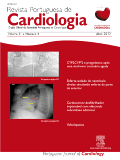
Revista Portuguesa de Cardiologia
Empowering the fight against heart disease through open access research.Revista Portuguesa de Cardiologia, published by Elsevier España SLU, stands as a pivotal resource in the realm of Cardiology and Cardiovascular Medicine. With its origins tracing back to 1970, this journal has cultivated a robust academic presence, achieving a 2023 Q3 ranking in its category, and currently holding a position of #220 out of 387 on the Scopus rankings, placing it within the 43rd percentile of its field. This open access journal, available since 2011, aims to disseminate high-quality research and insights relevant to contemporary cardiovascular issues. Its commitment to accessibility and knowledge exchange enhances its importance for clinicians, researchers, and students alike, fostering a more informed community in the fight against cardiovascular diseases. Operating from its base in Barcelona, Spain, the journal welcomes contributions that further the understanding and treatment of heart conditions, contributing significantly to the advancement of cardiovascular health.
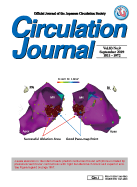
CIRCULATION JOURNAL
Advancing Cardiovascular Knowledge, One Study at a Time.CIRCULATION JOURNAL, published by the Japanese Circulation Society, stands as a premier platform for cutting-edge research in the fields of Cardiology and Cardiovascular Medicine. With an impressive impact factor placing it in the Q1 quartile for both cardiology and general medicine, this journal is essential for researchers and practitioners seeking to stay at the forefront of cardiovascular science. The journal's accessible open access options ensure that groundbreaking studies are widely disseminated, reflecting its commitment to advancing medical knowledge and improving patient care. Since its inception in 1996, CIRCULATION JOURNAL has fostered a global dialogue on vital cardiovascular issues, making it a vital resource for academics, healthcare professionals, and students alike. With its base in Tokyo, Japan, the journal not only highlights regional advancements but also contributes significantly to the global medical community.
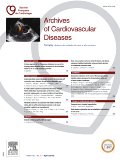
Archives of Cardiovascular Diseases
Transforming the future of cardiology with innovative insights.The Archives of Cardiovascular Diseases, published by Elsevier Masson, stands as a leading journal in the field of cardiology and cardiovascular medicine, with an impressive impact factor that underscores its relevance and influence. This esteemed journal, recognized in the Q2 category for both cardiology and miscellaneous medicine, aims to disseminate groundbreaking research, innovative methodologies, and clinical advancements that can shape the future of cardiovascular health. With its diverse array of open access options, researchers and students alike have the ability to engage with high-quality content, ensuring that cutting-edge findings are accessible globally. Since its inception in 2008, the journal has actively contributed to the advancement of knowledge in cardiovascular diseases, fostering collaboration among clinicians, researchers, and educators. Headquartered in Paris, France, Archives of Cardiovascular Diseases remains committed to enhancing our understanding of cardiovascular health and improving patient outcomes worldwide.
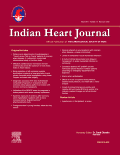
Indian Heart Journal
Exploring Heart Health Innovations Across BordersIndian Heart Journal, published by Elsevier, is a distinguished peer-reviewed journal dedicated to the field of cardiology and cardiovascular medicine. Founded in 1961, this journal has been a pivotal resource for researchers, healthcare professionals, and students, providing a platform for innovative studies and insights into heart health. The journal transitioned to an Open Access model in 2013, ensuring widespread dissemination of vital research findings to enhance global understanding of cardiovascular diseases. Ranked in the Q3 category for Cardiology and Cardiovascular Medicine in 2023, it holds a reputable position in the medical community, with a Scopus rank of #222 out of 387 journals in the same field, placing it in the 42nd percentile. The Indian Heart Journal strives to foster advances in clinical practice and research while addressing the unique cardiac health challenges faced in India and beyond.
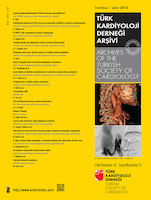
Turk Kardiyoloji Dernegi Arsivi-Archives of the Turkish Society of Cardiology
Empowering cardiology through open access and collaboration.Turk Kardiyoloji Dernegi Arsivi-Archives of the Turkish Society of Cardiology is a prominent peer-reviewed journal dedicated to advancing the field of cardiology and cardiovascular medicine. Published by KARE PUBL, this journal has established itself as a key resource for researchers, healthcare professionals, and students since its inception in 1990. As an Open Access journal since 2017, it ensures that cutting-edge research and clinical findings are readily accessible to a global audience, thus fostering collaboration and knowledge sharing among the cardiology community. With its recent rank in the Q3 quartile for Cardiology and Cardiovascular Medicine in 2023, and a Scopus rank of #282 out of 387, the journal is positioned to enhance its influence in the cardiovascular field, offering valuable insights and promoting evidence-based practices. The journal covers a wide range of topics within cardiology and cardiovascular research, making it an essential platform for scholars aiming to contribute to the ongoing dialogue in this vital area of medicine. For those eager to stay updated with the latest research trends and clinical practices in cardiology, Turk Kardiyoloji Dernegi Arsivi represents a crucial resource.
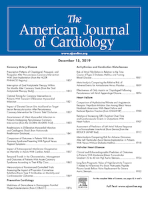
AMERICAN JOURNAL OF CARDIOLOGY
Pioneering Research in Cardiology and Cardiovascular MedicineThe American Journal of Cardiology is a leading peer-reviewed journal in the field of Cardiology and Cardiovascular Medicine, published by Excerpta Medica Inc-Elsevier Science Inc. Since its inception in 1958, the journal has consistently contributed to the advancement of cardiovascular research, providing a platform for groundbreaking studies and clinical findings that shape modern medical practices. With an impressive impact factor placing it in the Q1 category in its field for 2023, it ranks among the top journals in medicine, with a rank of #155 out of 387 in the Scopus database, reflecting its significance and rigorous editorial standards. The journal is committed to disseminating high-quality research that fosters innovation and enhances clinical outcomes in cardiology. Although it does not provide Open Access options, the American Journal of Cardiology remains an essential resource for researchers, healthcare professionals, and students looking to deepen their understanding of cardiovascular health.

Cardiology Research and Practice
Advancing cardiovascular knowledge for a healthier tomorrow.Cardiology Research and Practice is a leading academic journal dedicated to advancing knowledge in the fields of cardiology and cardiovascular medicine. Published by HINDAWI LTD, this journal has been an inclusive platform for open access research since 2009, facilitating the dissemination of high-quality studies that contribute to the global scientific community. With an impact factor placing it in Q2 of its category in 2023, it underscores its importance in delivering innovative insights and discoveries that shape clinical practices and policies. The journal covers a broad scope of topics including, but not limited to, cardiovascular disease prevention, innovative treatment modalities, and emerging technologies, appealing to researchers, healthcare professionals, and students alike. Located in the United States with its international reach, Cardiology Research and Practice serves as a critical resource for those dedicated to improving patient outcomes and advancing the field of cardiology.

World Journal of Cardiology
Elevating research, enhancing heart health.World Journal of Cardiology, published by BAISHIDENG PUBLISHING GROUP INC, stands out as a pivotal resource in the field of cardiology and cardiovascular medicine. With an ISSN of 1949-8462, this journal serves a global audience, promoting knowledge dissemination and collaboration among researchers, healthcare professionals, and students dedicated to advancing cardiovascular health. The journal demonstrates its credibility and impact in the field by achieving a respectable Q2 ranking in the 2023 category of Cardiology and Cardiovascular Medicine. Notably, it is listed in the Scopus database, ranking #189 out of 387 journals, placing it in the 51st percentile, which underscores its relevance and contribution to contemporary cardiovascular research. Although it operates under a subscription model, the journal provides diverse access options, ensuring that critical findings reach a wide audience. Through its comprehensive scope and commitment to publishing high-quality articles, the World Journal of Cardiology plays a vital role in shaping the future of cardiovascular science, making it an invaluable asset for those involved in this essential discipline.
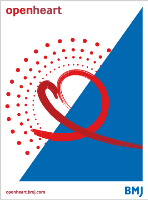
Open Heart
Unlocking the Heart of Cardiovascular ResearchOpen Heart is a prestigious, peer-reviewed open access journal published by BMJ Publishing Group, focusing on the dynamic field of Cardiology and Cardiovascular Medicine. Launched in 2013, the journal has rapidly ascended to prominence, achieving a Q1 quartile ranking in its category as of 2023, reflecting its high-quality scholarly contributions. With an active publishing history from 2014 through 2024, Open Heart offers an expansive platform for researchers, clinicians, and students to disseminate and access groundbreaking research findings, reviews, and case studies that address critical issues in cardiovascular health. The journal is indexed in Scopus, ranking 133rd out of 387 in the Medicine - Cardiology and Cardiovascular Medicine category, placing it within the 65th percentile of its peers. Based in the United Kingdom, it promotes global research and collaboration in the cardiovascular domain, ensuring open access to vital knowledge for all stakeholders in the medical community. For access options and more information, visit the Open Heart website.